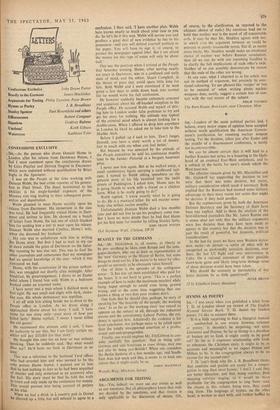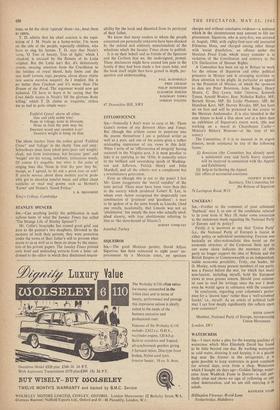HYMNS AS POETRY
SIR,—I was away when you published a letter from T. D. of London about my review of The English Hymnal Service Book. T. D. denies my fondest points; I'd like to reassert them.
It is a little surprising to find a liturgical manual
. . sandwiched in one review between volumes of poetry.' It shouldn't be surprising, not since Literature and Dogma. So far as liturgy is a devotion of human art to God, it ought surely to be good art? So far as it expresses relationship with God, or rehearses the Christian story, it ought to be as accurate and meaningful as we expect Donne and Milton to be. Is the congregation always to be an excuse for the second-rate?
T. D. 'can't think why Dr. J. B. Broadbent thinks that canticles and psalms are easier for a congre- gation to sing than most hymns.' I don't. I said they are better literature, and that, being tuneless, their meaning surviycs singing; so it would be more profitable for the congregation to sing them--and, the chants in this volume being easy, they could sing them. The language of hymns, on the other hand, is weaker to start with, and further baffled by tune; so let the choir 'operate' them—i.e., treat them as opera.
T. D. admits that his chief concern is the repu- tation of J. M. Neale as a hymn-writer. I'm more on the side of the people, especially children, who have to sing his hymns. T. D. says that Neale's verse, '0 Tree of beauty, Tree of light,' which I attacked, is excused by the flatness of its Latin original. But the Latin isn't flat, it's idolatrously ornate, swaying attention from the Crucifixion to the fetishes of royal blood, holy limbs and the tree itself (ornata regis purpura, electa digno stipite tam sancta mentbra tangere). As I implied, this is no better than Crashaw and it's worse than The Dream of the Rood. The argument would now get technical. I'll have to leave it by saying that the Crux fidelis stanza in Neale's 'Of the glorious Body telling,' which T. D. claims as 'exquisite,' strikes me as bad in quite simple ways:
Faithful Cross! above all other, One and only noble tree!
None in foliage, none in blossom, None in fruit thy peer may be; Sweetest wood and sweetest iron 1 Sweetest weight is hung on thee.
The idiom lurches from the rather grand 'Faithful Cross!' and 'foliage' to the chatty 'One and only.' Schoolboys must have joked peer/pear and weight/ clock, not from irreverence, but because 'peer' and 'weight' are the wrong, indefinite, indecorous words. Of course it's singable; but what is the point of singing lines like 'None in fruit thy peer may be,' except, as I agreed, to let out a good roar or sob? If you're serious about these matters you've prob- ably got to abandon tuneful music and either chant canticles or read real poems such as Herbert's 'Easter' and Donne's 'Good Friday.'







































 Previous page
Previous page